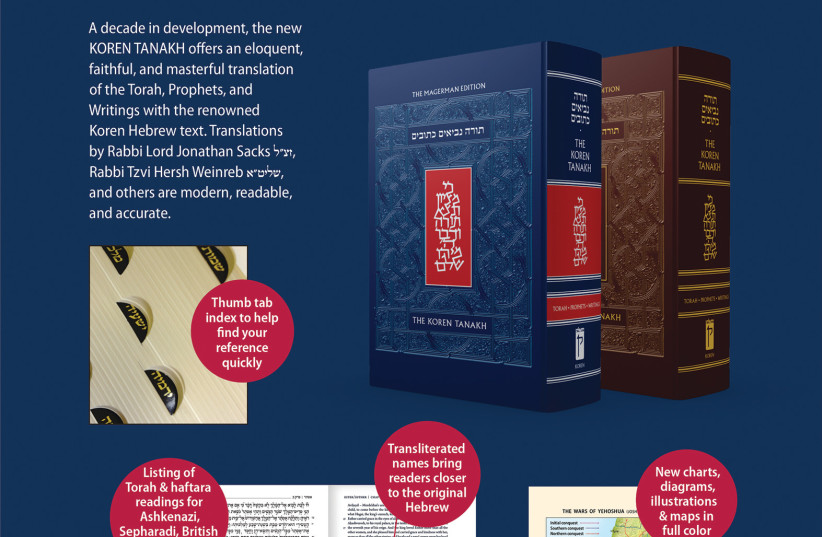When many Jews were more comfortable reading Greek than Hebrew, just over 2,000 years ago, they produced a Greek Bible translation known as the Septuagint. It has been the object of study and interest ever since. A few centuries later, when many Jews were more comfortable in Aramaic, the Targum Onkelos appeared, another text of enduring influence.
Today, 40-50% of the world’s Jews are more comfortable reading in English than in Hebrew. Yet, no single English translation of the Hebrew Bible dominates the Jewish world. The Jewish Publication Society of America has produced two very successful translations, one in 1917 and another in stages, completed in 1982 (NJPS = the “New” Jewish Publication Society of America Tanakh translation). Jewish Studies scholars generally use NJPS, but it has not had the same acceptance in religious circles. A number of new haredi (ultra-Orthodox) translations have been published in recent decades, including ArtScroll’s The Chumash: The Stone Edition and Aryeh Kaplan’s Living Torah. Everett Fox and Robert Alter have produced new academic translations, each with a different purpose.
The Koren Tanakh: Magerman Edition has recently entered this crowded market. Koren Publishers is already well-known for its Hebrew-language Bibles. The text produced by their team of scholars is considered the most accurate, and the font and layout are attractive. In the new Magerman edition, the Koren Hebrew text appears on one side, with a new English translation facing it. Back in 1967, as the introduction to the current volume informs us, Koren had published a different Hebrew/English Bible whose English was an update of an 1881 translation that had tried to preserve as much of the language and rhythm of the King James “Authorized Version” of 1611 “as Jewish sentiment permitted.” The 1967 translation never caught on.
For this new translation, Koren has assembled a remarkable team, headed by Rabbi Jonathan Sacks, who was also responsible for the translation of the Torah and of many chapters of Psalms. Sadly, he died before he was able to complete the project, but a fine editorial committee finished it. The new volume, to be released in September 2021, is handsome and easy to use. The English text has brief, useful footnotes, and the volume includes helpful maps, charts, and timelines, also in English. The long list of respected rabbis and scholars who had a hand in the project includes: Baruch Alster, Joseph Angel, Elie Assis, Michael Avioz, Shawn Zelig Aster, Yitzhak Berger and Adele Berlin (and those are only the ones whose last names begin with A or B).
I will highlight two examples of the translation that impressed me.
Metaphors always present a challenge to translators. In the book of Ruth, the first time Boaz meets Ruth, who had moved from Moab to the land of Israel, he tells her that he has already heard about her admirable character, how she had come “to take shelter under the kanaf of God” (Ruth 2:12). Later in the story, when Ruth surprises Boaz at night on the threshing floor, she urges him, “Spread your kanaf over your maidservant [i.e. over me].” (Ruth 3:9) Most often, the Hebrew word kanaf means a (bird’s) wing, but it can also be a garment, or the corner of a garment. NJPS translates the first phrase as a reference to God “under whose wings you have sought refuge,” and the second as Ruth’s request that Boaz, “spread your robe over your handmaid.” These translations are accurate, but they fail to convey the fact that Ruth subtly throws Boaz’s own language back at him, suggesting that the shelter that she needs comes not from God’s kanaf, but from Boaz’s. The new Koren translation successfully preserves the word play in English: Boaz praises Ruth for coming to take shelter under God’s “mantle,” and Ruth subsequently asks Boaz to “spread your mantle over your maidservant.” (Neither the King James version, the Revised Standard Version, the 1967 Koren translation, nor ArtScroll preserves this play on words. Robert Alter does, translating kanaf in both verses as “wing.”)
Another issue for translators is translating passages that are unclear or difficult in their context. In Genesis 45:3, when Joseph stops masquerading and reveals himself to his brothers, he says to them (in the King James translation), “I am Joseph. Doth my father yet live?” His question seems out of place since, as closely as three verses before, his brothers had been telling him news about their father. Furthermore, Joseph had repeatedly asked and received information about Jacob earlier in the narrative. Like King James, many translators (including ArtScroll, Kaplan, Alter and the 1967 Koren translation) preserve the difficulty in the English, too. NJPS makes Joseph’s question less jarring by stretching the meaning of the Hebrew, ha-od avi chay, to “Is my father still well?” The Koren translation effectively conveys, in my assessment, the emotion behind Joseph’s redundant question: “I am your brother Yosef. Is my father really still alive?”
Translations of the Bible will always be helpful for providing insights into the text, even for those who understand Hebrew well. Koren is to be congratulated for the high quality and the literary merit of this monumental undertaking.
The Koren Tanakh: The Magerman Edition – Compact MaalotBy Rabbi Jonathan SacksKoren Publishers2072 pages; $34.95

